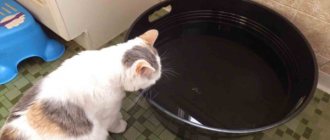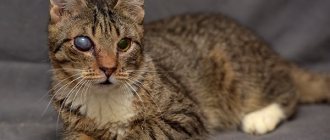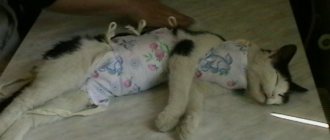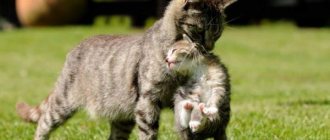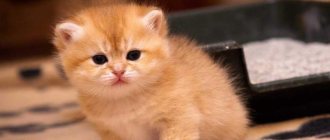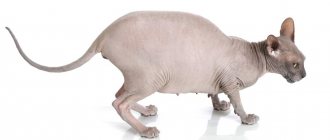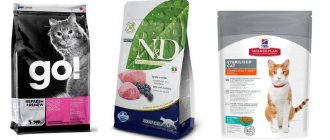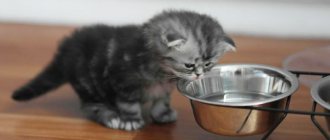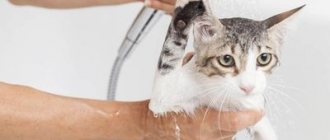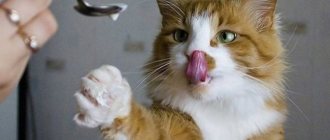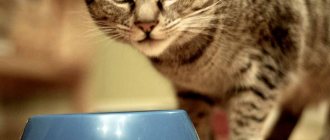If a cat drinks a lot of water, then he needs to compensate for the lost fluid that leaves the body, for example, with sweat or urine. The list of causes of thirst or polydipsia ranges from over-salted dishes on the cat's menu to the presence of a serious illness. If changes in the pet’s diet and living conditions have not reduced the excess need for fluid, you should definitely show it to a specialist at the veterinary clinic for examination for possible pathologies that provoke the desire to drink a lot of water. Until the exact cause of thirst is determined, your pet’s fluid intake cannot be limited.
Veterinarians believe that a healthy cat drinks little water and this is normal, especially when wet food dominates the diet.
The cat drinks a lot of water: reasons
The causes of polydipsia are physiological and pathological.
The following reasons are considered physiological:
- Consumption of dry granules. The body of a mouse, the cat's main prey, contains about 30% dry matter. In dehydrated food - 90. Therefore, for every gram of granules consumed, you need to drink 90/30 = 3 g of water.
- Pregnancy, lambing and lactation require an increased amount of moisture to form amniotic fluid, restore lost fluid, and produce milk.
- High physical activity: the pet has played enough, runs around and drinks water greedily.
- Increased air temperature: the cat does not have sweat glands, it cannot cool itself by evaporation from the surface of the body. Therefore, you have to lick yourself intensively, wetting the fur with saliva. The second method of cooling is rapid breathing with an open mouth. Loss of moisture is compensated by increased drinking.
If your pet has no pathological symptoms, polydipsia is most likely due to physiological causes. However, the combination of thirst and painful symptoms is cause for concern.
Be sure to read:
A cat has a stuffy nose: reasons, how to treat it, is it possible to use nasal drops, what will happen if a runny nose is not treated.
The following causes of polydipsia are considered pathological:
- Stressful situations: an inadequate situation with fear develops under the influence of stress noises. To reduce the adverse effects of biologically active components on the body, they need to be diluted and excreted in the urine.
- Eating human food. Unusual food contains an increased amount of table salt and dry matter.
- Diseases: polydipsia occurs with digestive disorders, diabetes, urolithiasis, renal and liver failure, poisoning, infections, infestations. Any pathological conditions are characterized by the accumulation of toxic metabolites in the blood, which must be gotten rid of as quickly as possible - diluted with water, removed with urine.
- Effect of medications. In some cases, diuretics are prescribed by a veterinarian. In other situations, side effects of medications develop. Increased fluid consumption causes thirst.
- Old age: Older animals develop many chronic diseases, the symptoms of which are difficult to notice individually, but collectively they manifest as polydipsia.
Treatment of polydipsia
When a cat begins to drink a lot of water, the exact cause of the phenomenon is first determined. Thirst caused by natural factors is harmless. Polydipsia goes away, for example, in a nursing cat after weaning the babies. Increased water consumption caused by the cat's diet also normalizes after adjusting the animal's menu. Veterinarians state that dry food provokes thirst in cats, so you should not feed your pet only this. The diet should be varied, with a small amount of salt.
When thirst is increased due to the effects of a prescribed medication, this is abnormal. You need to contact your veterinarian to review the treatment regimen, stop taking the drug that causes extreme thirst, and replace it with another drug. If the symptom is not associated with organ ailments, and the cat drinks a lot due to stress, then veterinarians recommend preventing the pet’s desire to get drunk. After time, the density of urine will be restored to normal levels without negatively affecting the health of the animal.
If you suspect the development of the disease, you must contact your veterinarian for a full examination of the animal.
When a cat begins to drink a lot of water, and there are suspicions that this is a sign of a possible disease, it is necessary to have the pet examined at a veterinary clinic. Using laboratory tests of urine and blood, as well as instrumental diagnostic methods, a specialist will determine the pathology that provokes thirst and prescribe appropriate therapy. Some diseases are incurable, but with proper care the cat can live an active life for a long time.
The cat drinks a lot of water and loses weight
Thirst and weight loss are a formidable pathological symptom.
The combination of thirst and weight loss develops in the following situations:
- poor nutrition;
- pathologies of the urinary tract;
- poisoning leading to vomiting and diarrhea;
- hormonal disorders;
- diabetes.
If a cat feeds on table scraps, a lot of salt and spices enter the body. When feeding only meat or fish, an excess of proteins occurs. The body spends a lot of energy processing such food, and the absorption of nutrients remains low.
When protein overfeeding, uric acid or other uric salts are formed, which are poorly soluble in blood or urine. If it is not possible to remove toxins, self-poisoning develops. That's why the cat drinks all the time. The struggle for survival comes to the fore; there is no time to digest the consumed food. To stop the intake of toxins, you need to stop eating.
In case of urolithiasis or cystitis, the primary task is to prevent salt crystallization. To prevent oversaturation of solutions, they are diluted with drunk water.
Be sure to read:
A cat sniffles through its nose: reasons, what to do when it is normal, sniffling is a sign of disease
In renal failure, the kidneys are unable to filter certain substances, such as phosphates. In elevated concentrations the compounds are poisonous. They have to be diluted. For the same reason, thirst occurs in diabetes mellitus: you need to dilute the glucose.
About the norm
Changing your pet's needs is not always a bad thing! Therefore, there is no need to panic if your cat drinks a lot of water. The reason may be completely harmless, and the consequences of changing the drinking regime will not affect the animal’s well-being at all. Felinologists do not have a definite figure for mandatory water consumption - this number depends on nutrition, climate, breed, age and many other factors.
Attention! Do not try to force water on a healthy cat! With rude actions you will not only not achieve the desired result, but will also frighten your pet. The animal, as a rule, knows very well how much water it needs!
Typically, veterinarians advise calculating the amount of required moisture so that there is 0.03 milliliters of liquid per gram of pet’s body weight. It doesn’t have to be just water; milk, canned food, and wet food will do.
It is very important to pay attention to your pet's diet. If a cat drinks a lot of water, the reasons may lie solely in a change in diet. Dry food tends to “pull” moisture from the animal’s body. Because of this, it is recommended to equalize the amount of water to the weight of food in a ratio of 1:3.
Vomiting in a cat - poisoning and more
In addition to the first version that comes to mind, that the cat was poisoned, there are a number of other reasons for the malaise.
The most important thing to note is severe overeating. If an animal has been hungry for a long time and then eats a lot, the stomach does not have time to cope with the load
Excess food is eliminated naturally.
Animals can independently regulate vomiting processes, relieving themselves of the feeling of heaviness and discomfort in the abdomen.
If the food was eaten too quickly, it is possible that the walls of the esophagus were strongly irritated by something, which also led to vomiting.
Be sure to monitor your pet's diet. Feeding foods that are difficult and take a long time to digest creates additional problems with the gastrointestinal tract. If you feed your cat dry food, it may be worth switching to a different one.
Recommendations for improving the condition:
- Analyze what the animal has eaten recently. Perhaps the condition was affected by a new product or food that had not been introduced into food before.
- For constipation combined with vomiting, give an enema. Toxins accumulated in the body will be eliminated faster.
- Cats with long, thick hair require thorough brushing every day. It is very likely that the cause is wool stuck in the stomach.
https://youtube.com/watch?v=csVXHEvFsI8
Video text
It is believed that cats have the most unusual death, because they prefer to die alone, leaving home, and they do it completely unexpectedly. So how do you understand that the time has come and your pet will soon leave you forever and what to do about it? Look further. Typically, cats live for about 16 years. Of course, there are exceptions when they live to 25 or even more, but this happens very rarely. If your furry friend has been living with you for more than 14 years, then it is quite possible that he will soon pass away.
Subscribe to the channel and be the first to know everything: https://goo.gl/H6U7p6
Production Music courtesy of Epidemic Sound!
Food poisoning
If the cat is lethargic, has stopped eating, and is constantly vomiting, the reason is obvious - severe food poisoning.
How an animal can be poisoned:
- Stale food – be sure to monitor your pets’ diet. After each meal, it is recommended to throw away the remaining portion and leave the bowl clean. In a warm environment, destructive microorganisms quickly develop - the causes of frequent poisoning.
- Household chemicals - for example, leftover dishwashing liquid. It is necessary to rinse the bowl thoroughly under running water after each wash.
- Medicines - in the instructions for use of each drug, the dosage is clearly calculated in accordance with the weight and age of the animal. Exceeding the permissible limit is very dangerous.
- Vapors of paints and other chemicals - during repairs or work with strong-smelling substances, the animal should be kept away. This way you will protect him from poisoning and preserve his sense of smell.
What to do in case of poisoning? Give plenty of fluids and liquid food - weak broths, weak porridges, slightly diluted fermented milk products.
It is quite possible that the cat will not want to eat. Try to feed her at least in very small portions - this way toxic substances will be eliminated faster when going to the toilet.
How and how to help an animal
If a cat refuses food and water, then the first thing to do is take your pet to a veterinarian. It is not possible to make a diagnosis on your own at home, so you need to call a doctor at home or take your pet to the clinic.
If it is impossible to get to the veterinarian in the next 24 hours, then you need to provide the cat with rest. To do this, you should prepare a clean litter; it should not be too soft or too hard. If an animal is hiding, you should not force it out of its hiding place. You can only place a bowl of food and fresh water nearby.
Bowls of water and food should always be available to the animal.
If the doctor has determined the cause, then you should follow the specialist’s recommendations and give medications according to instructions in the required dosages. This must be done calmly; you must not cause pain to the animal. Before giving medication, the cat needs to be stroked, and the tone of voice should be calm. This way, the pet will tolerate the treatment better, will not resist too much and will recover faster.
Additional recommendations:
- If the cause is stress, then the cat should be left alone for a while. It is advisable to call her to eat in a gentle tone. A calm and quiet environment, the absence of extraneous noise and periodic stroking will help you recover from stress.
- If your pet doesn't like the food, you need to replace it as soon as possible. It is recommended to give preference to balanced foods rather than cheap options containing a lot of harmful additives.
- In case of gastrointestinal upset and poisoning, you can give the animal activated charcoal (500 mg per 1 kg of weight). In this case, the tablet must be crushed and dissolved in 1 tsp. water. It is most convenient to give medicine using a syringe without a needle. It is enough to do this procedure once before seeing a doctor.
- Ticks and fleas are eliminated using special antiparasitic medications. You should not use them on your own; you should first consult your doctor. However, if this is not possible in the near future, and the animal has fleas or a tick is found, you can purchase Bars or Celandine shampoo.
- If the cause is helminthic infestations, then treatment is carried out with the help of anthelmintic drugs. The medication should be given only according to the regimen recommended by the doctor. Otherwise, larvae may remain, which will provoke a relapse.
- To alleviate the condition of an animal with gum inflammation, you can use a solution of Miramistin or potassium permanganate. It is necessary to treat the gums using a cotton pad and the selected product. This needs to be done 2 times a day. Do not press on problem areas.
A weak solution of potassium permanganate can be used to treat inflamed gums
What to do if your pet doesn’t eat, doesn’t drink and constantly sleeps
If an animal does not eat or drink, and also sleeps constantly, then this is an alarming signal of serious health problems. However, in extremely rare cases this is associated with stress. In this case, the pet should be left alone and allowed to rest. There is no danger in inactivity after stress. If the animal is lethargic, does not eat or drink for another reason, then postponing a visit to the doctor is dangerous, since with a serious pathology the cat may die.
Some recommendations that will help you hold out until the doctor arrives:
- It is necessary to ensure that fresh air enters the room.
- Do not disturb the pet. If there are other animals in the house, then for safety reasons it is better to isolate them from contact with the sick cat.
- Make sure the water in the bowl is always clean.
- If there is a special medicinal herb for cats in the house, which breeders often grow in pots, then you can pick a little and put it next to your pet. If desired, the animal can be treated with such a safe remedy.
How to help a kitten
If the kitten does not eat anything or drink water, then first of all you need to pay attention to the nature of the food. Small pets need special soft food
It is impossible to give a kitten food intended for adult animals, since the gastrointestinal tract of babies is still very weak. Long-term refusal of water is dangerous, so you can give your pet water using a pipette. Every hour you need to give water forcibly. The liquid should be administered in small quantities - one pipette at a time is enough.
Giving your kitten water using a pipette will prevent dehydration
In addition, the kitten should be carefully examined for rashes, sores and fleas.
Particular attention should be paid to the withers and ears. If everything is clear, then most likely the problem lies in the functioning of the internal organs, which can only be determined in a clinical setting
When thirst is normal
The usual desire to drink increases in the following cases:
- pregnancy;
- breastfeeding large offspring;
- heat outside or increased ambient temperature indoors;
- active long-term games (increased physical activity);
- feeding dry food or food with a high salt content;
- taking certain medications (corticosteroids, diuretics, recovery from anesthesia);
- worries, stress.
The reasons listed are temporary. This means that after they are eliminated, the cat begins to drink the usual amount of water with normal frequency.
